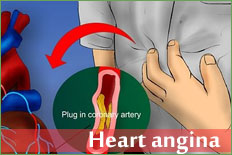Health Centers > Heart Diseases Health Center > Heart Attack Risk Factors
Heart Attack Risk Factors
Heart Attack Risk Factors
Cardiovascular disease can take many forms: high blood pressure, coronary artery disease, valvular heart disease, stroke, or arrhythmias (irregular heartbeat). According to the World Health Organization, cardiovascular disease causes more than 17 million deaths in the world each year and is responsible for half of all deaths in the United States.
What Is a Heart Attack
What is
Other Names
Causes
Risk Factors
Signs and Symptoms
Diagnosis
Treatments
Prevention
Life After
Heart Failure Overview
Heart Attack FAQ
Coronary artery disease, the most common form of cardiovascular disease, is the leading cause of death in America today. Cancer, the second largest killer, accounts for a little more than half as many deaths.
In the United States, more than 80 million Americans have some form of cardiovascular disease. But thanks to many studies involving thousands of patients, researchers have identified certain factors that play important roles in a person's chances of developing heart disease. These are called risk factors.
Risk factors are divided into two categories: major and contributing. Major risk factors have been proven to increase your risk of heart disease. Contributing risk factors can lead to an increased risk of heart disease.
The more risk factors you have, the more likely you are to develop heart disease. Some risk factors can be changed, treated, or modified, and some cannot. But by controlling as many risk factors as possible through lifestyle changes, medicines, or both, you can reduce your risk of heart disease.
Major Risk Factors
High Blood Pressure (Hypertension). High blood pressure increases your risk of heart disease, heart attack, and stroke. If you are obese, smoke, or have high blood cholesterol levels along with high blood pressure, your risk of heart disease or stroke greatly increases.
Blood pressure can vary with activity and age, but a normal reading for a healthy adult who is resting should be 120/80.
High Blood Cholesterol. One of the major risk factors for heart disease is high blood cholesterol. Cholesterol, a fat-like substance carried in your blood, is found in all of your body's cells. Your liver produces all of the cholesterol your body needs to form cell membranes and to make certain hormones. Extra cholesterol enters your body when you eat foods that come from animals (meats, eggs, and dairy products) or are high in saturated fat.
Too much low-density lipoprotein (LDL or "bad cholesterol") in the blood causes plaque to form on artery walls, starting a disease process called atherosclerosis. When plaque builds up in the coronary arteries that supply blood to the heart, you are at greater risk of having a heart attack.
Diabetes. Heart problems are the leading cause of death among people with diabetes, especially in the case of adult-onset or Type 2 diabetes (also known as non-insulin-dependent diabetes). Certain racial and ethnic groups (African Americans, Hispanics, Asian and Pacific Islanders, and Native Americans) have a greater risk of developing diabetes. The American Heart Association estimates that 65% of patients with diabetes die of some form of cardiovascular disease. If you know that you have diabetes, you should already be under a doctor's care, because good control of blood sugar levels can reduce your risk. If you think you may have diabetes but are not sure, see your doctor for tests.
Sex. Overall, more men have heart attacks than women do, and they experience them earlier in life, too. While a woman's risk of dying from heart disease increases after menopause, it's still lower than a man's. Your race. Somewhat related to family history, your race can also predetermine part of your risk of heart disease. African Americans, American Indians, Mexican Americans, and native Hawaiians are more likely to have heart disease than Caucasians, but this is partly due to other risk factors that these populations tend to experience, such as diabetes and high blood pressure.
Body type. Whether or not you become overweight or obese is mostly within your control, but you cannot control your weight distribution, which refers to where your body stores fat. For years, experts warned that people who tend to carry excess weight in their belly area (known as "apple" shapes) are at a greater risk of several health problems, including heart disease, while "pear" shaped bodies that store more fat in the lower body don't have the same risk. However, one 2010 study published in The Lancet dispelled that idea, saying that being overweight (regardless of where your body stores the fat) is a heart disease risk factor. Your genetics determine your body type; if you are apple-shaped now, you will always be apple-shaped, even if you lose weight. Still, maintaining a healthy body weight - which would decrease your waist circumference - is a controllable risk factor (more on that below) that can reduce your heart disease risk.
Drinking habits. Drinking too much - and possibly too little - seems to increase one's risk of heart disease. People who drink moderately (defined as an average of one drink day for women and two drinks daily for men) have a lower risk of heart disease than nondrinkers. However, the AHA does not recommend that teetotalers start drinking (or that drinkers increase the amount they drink) in order to achieve these purported benefits. Drinking too much has far more risks than not drinking. Too much alcohol can raise blood pressure and triglycerides, as well as contribute to obesity, irregular heartbeat, cardiomyopathy, alcoholism, heart failure, cancer, stroke and other diseases. To protect your heart, cut back on drinking; if you don't drink often - or at all - don't start.
Bibliography
American Heart Association website. Available at: http://www.americanheart.org . Accessed August 14, 2008.
National Heart, Lung, and Blood Institute website. Available at: http://www.nhlbi.nih.gov/ .
Mayo Clinic website. Available at: http://www.mayoclinic.com/health/heart-attack-symptoms/HB00054 . Accessed January 23, 2007.
Huffington Post. "Is the Apple or Pear-Shaped Body Type More Dangerous?," accessed March 2011. www.huffingtonpost.com.
National Heart, Lung and Blood Institute. "Coronary Heart Disease Risk Factors," accessed March 2011. www.nhlbi.nih.gov.
WebMD. "Risk Factors for Heart Disease," accessed March 2011. www.webmd.com.
Heart Disease Risk Factors
Metabolic syndrome & Heart Disease Risk
Eye disease & Heart Disease Risk
Bran in diet & Heart Disease Risk
HDL limit & Heart Disease Risk
Rheumatoid arthritis & Heart Disease Risk
Periodontal bacteria & Heart Disease Risk
Laid off job & Heart Disease Risk
Waist circumference & Heart Disease Risk
Diet high in milk & Heart Disease Risk
Hysterectomy & Heart Disease Risk
Breast Cancer treatment & Heart Disease Risk
Work stress & Heart Disease Risk
Frequent tipple & Heart Disease Risk
Low-Fat Diet & Heart Disease Risk
Chronic stress & Heart Disease Risk
Passive smoking & Heart Disease Risk
Abdominal fat & Heart Disease Risk
Diet, exercise & Heart Disease Risk
Short smoking breaks & Heart Disease Risk
Breast cancer chemo & Heart Disease Risk
Osteoarthritis & heart disease
Anemia & heart disease
Short legs & heart disease risk
Tamoxifen & heart disease risk
Optimism & Heart Disease Risk
Antidepressant & heart attack risk
Tomato juice & heart disease risk
High-dose steroids & heart disease risk
COX drugs cause heart disease
Fear of terror & Heart Disease Risk
Stress & Heart Disease Risk
Underactive thyroid & Heart Disease Risk
Sibling history & Heart Disease Risk
Celebrex & Heart Disease Risk
Coffee & Heart Disease Risk
Vioxx & Heart Disease Risk
Diabetes & Heart Disease Risk
Low fitness & Heart Disease Risk
Antibiotic interaction & Heart Disease Risk
Transfusions & Heart Disease Risk
Vegetable oils & Heart Disease Risk
Race & Heart Disease Risk
Stopping NSAIDs & Heart Disease Risk
Blood pressure & Heart Disease Risk
Infection & Heart Disease Risk
Working while ill & Heart Disease Risk
Insulin & Heart Disease Risk
Lifestyle changes & Heart Disease Risk
Anti-inflammatory protein & Heart Disease Risk
Painkillers & Heart Disease Risk
Merck's Arcoxia & Heart Disease Risk


